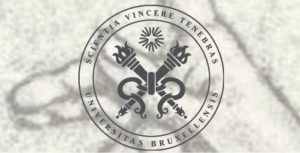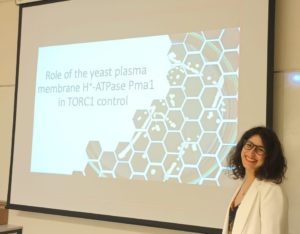In this article entitled “The A2357T substitution in the kinase domain of yeast Tor1 confers growth promoting TORC1 activity independent of Gtr1/2 and Pib2” and published by Christopher Dereppe and collaborators, we report the isolation of a mutant form of the Tor1 kinase that remains active despite loss of the two main upstream activators of TORC1. This Tor1 mutant is particulary interesting because previous studies have identified an equivalent mutation in human mTOR from multiple cancer cells.
|
|||||
|
Alex Deschamps and Bruno André participated to the 40th edition of the « Small Meeting on Yeast Transport and Energetics (SMYTE) » organized in Stockholm (Sept 3 – 6, 2025) by Pr. Per Ljungdahl. The Smyte annually gathers scientists from all countries who are interested in diverse aspects yeast membrane transporters: structure-function relationships, regulation, and signaling properties. This Smyte was exceptional as it was the 40th edition of the meeting. Both Bruno and Alex were invited to give oral presentations and Alex also presented a poster. It was a great pleasure to meet again many colleagues and friends of the « yeast membrane transport » community, including our collaborators Christos Gournas and Melody Cools (Labiris institute, Anderlecht).
Almost our entire lab team attended the conference held at ULB on April 25. The talk, entitled “Les religions: un frein à la connaissance scientifique“, was delivered by Prof. Kristoff Talin, a CNRS professor of sociology in France. He presented very insightful findings from his research, and the conference was introduced with a brief historical reflection on the principle of “libre examen”. It was a great pleasure to host Prof. George Diallinas (University of Athens, Greece), who delivered an outstanding seminar on March 2 entitled ‘A major Golgi-independent trafficking route for non-polarized plasma membrane cargoes unveiled in Aspergillus nidulans’.
Christopher Dereppe attended the “6th European Workshop on AMK and AMPK-related kinases ». He represented in a poster his results about the influence of Snf1, the yeast AMPK kinase, on TORC1.
On May 24th, Nadia Guarini publicly presented her PhD work and successfully received her diploma. Her research dealt with the molecular relationships between membrane transporters and TORC1, a kinase complex playing a pivotal role in control of cell growth. More specifically, she focused on initial TORC1 activation upon nutrient uptake into yeast cells and the important role in this process of the most abundant cell surface protein, namely the H+-pump encoded by the PMA1 gene. The signal of this activation is the influx of H+ coupled to active nutrient uptake via permeases and sensed by the Pma1 H+ pump. Nadia has solved the long-sought question of what are the protein kinases and phosphatases mediating Pma1 phosphoregulation and she also uncovered an interesting negative feedback control of Pma1 by activated TORC1. Congratulations to Nadia for her scientific achievements and thanks to her for the excellent time spent with her in the lab ! |
|||||
|
Copyright © 2026 Molecular Physiology of the Cell - All Rights Reserved Powered by WordPress & Atahualpa |
|||||








